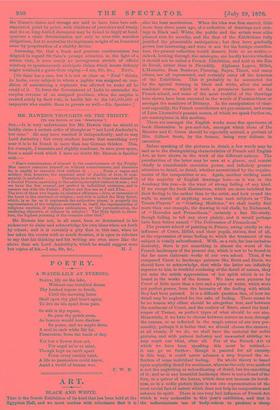MR. IlAWEIS'S THOUGHTS ON THE TRINITY. [To THE Enrroa 01
THE SPECTATOR:1
SIR,—It is very unfortunate for Mr. Haweis that he should so boldly claim a certain order of thought as "not Lord Amberley's, but mine." He may have reached it independently, and so may Lord Amberley ; but every student knows that something very near it is to be found in more than one German thinker. This, for example, I translate and slightly condense, to save your space, from a small work which I have no doubt Mr. Haweis is familiar with :—
" lilan's consciousness of himself is the consciousness of the Trinity. Man cannot conceive himself as without consciousness, and therefore he is unable to conceive God without it From a vague and solitary God, however, the essential need of duality, of love, of com- munity, is excluded Therefore, he needs to incarnate himself in a Second Person, answering to the anthropomorphic instinct in man ; and we have the Son created, yet perfect in individual existence, and in
essence one with the Father. Father and Son are as / and Thou The love of these two begets an abstract effluence,—love, or surrender of the heart in the sentiment of religion ; and this is called the Holy Spirit, which, in so far as it represents the subjective phase, is properly the representation of the religions sentiment to itself, the representation of religious emotion, of religious enthusiasm, or the personification, the rendering objective, of religion in religion ! The Holy Spirit is, there- fore, the highest yearning of the creature after God."
Mr. Haweis has not, in all cases, been so determined in his endeavour to claim and acknowledge his own ideas when set forth by others ; and it is certainly a pity that in this case, when he has taken the course with so much decision, it is open to scholars to say that his thinking and his writing are even more like the above than are Lord Amberley's, which he would suggest were but copies of his.—I am, Sir, &c., ' H. J.


































 Previous page
Previous page